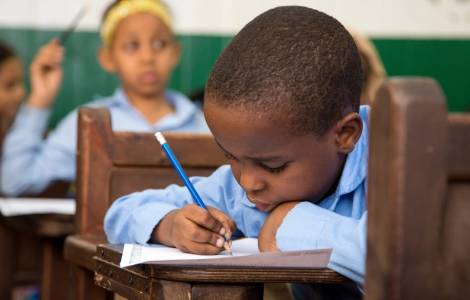
Scott Nelson - UNHCR
by Cosimo Graziani
Cairo (Agenzia Fides) - The humanitarian emergency faced by millions of refugees and displaced people in Africa, resulting from the numerous conflicts on the continent, is becoming even more critical for school-age children. Guaranteeing their right to education is an urgent and essential task. In recent weeks, the situation of Sudanese refugee students in Egypt has been the focus of attention. Following a meeting between the Foreign Ministers of Sudan and Egypt, December 28, 2024 was set as the date for the end-of-year exams for the 2023 academic year.
According to official data, there are approximately 1.2 million Sudanese refugees in Egypt, although the UN Refugee Agency (UNHCR) has registered 834,000. Children under 16 arriving from Sudan are not required to register upon arrival in Egypt, which exacerbates the problems related to their integration into the education system. The main obstacles include high school costs, the redistribution of refugee children in Egyptian schools, the lack of organization of educational institutions for them and poor integration into the school environment. For those who manage to register, access to education is a challenge, but for those who cannot, the right to education is virtually denied.
According to the NGO Human Rights Watch, for those who do not obtain registration, the right to education in Egypt is not guaranteed. And this applies not only to Sudanese, but also to those from other war zones, such as Palestinian refugees.
Although access to education for refugee children in Egypt faces numerous challenges, their situation is relatively favourable compared to that of the millions of children who remain in Sudan, trapped in a context of violence and food insecurity. According to recent BBC estimates, up to five million children are internally displaced in Sudan, where education is taking a backseat to the struggle for survival. Vast regions of Africa are devastated by armed conflict, struggles for control of resources and violence by militias and extremist groups. In countries such as the Sahel, Nigeria, the Democratic Republic of Congo and Ethiopia, schools become targets of attack, as militias see the continuity of education as an obstacle to their activities. According to the UN, almost 40% of attacks on schools in the world are recorded in Africa, where more than 2,500 such incidents have been documented in recent years.
In the Sahel, up to 14,000 schools remain closed, leaving 2.5 million children out of the education system. In the Democratic Republic of the Congo, the situation is particularly dire in the eastern regions, where both local militias and groups backed by neighbouring countries have forced the closure of at least 500 schools in North Kivu alone in 2024. According to UNESCO data, sub-Saharan Africa accounts for 30% of all out-of-school children in the world.
The impact of this crisis is even more alarming when one considers that Africa is home to the youngest population on the planet. The exclusion of millions of children and young people from education not only perpetuates poverty, but also compromises the economic and social development of the continent. According to UNICEF, in 2020 there were more than 1.8 billion children living in slums in large cities, the majority in Africa and Asia, many of them refugees or displaced by conflict. Lack of access to education also has a significant gender impact. Girls are the first to leave school during conflicts and the last to return when they end, perpetuating their vulnerability and inequality in access to future opportunities. (Agenzia Fides, 27/12/2024)